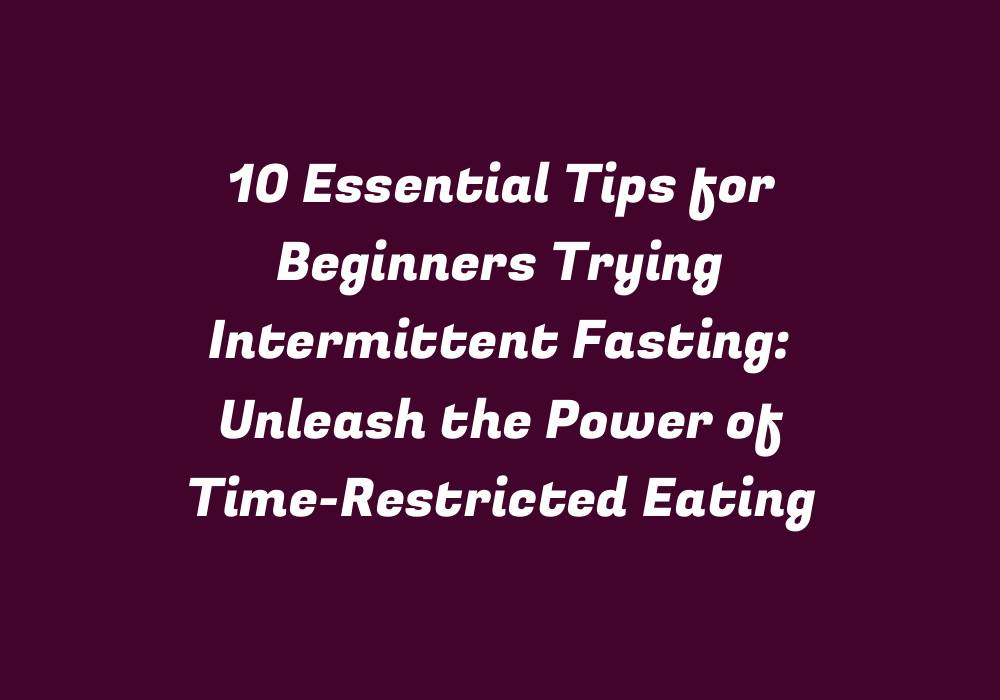Introduction
Intermittent fasting (IF) has gained immense popularity in recent years as a potential weight management strategy, lifestyle choice, and wellness practice. Despite its growing appeal, many beginners find themselves overwhelmed by the seemingly complex array of methods and techniques available. This article aims to offer ten essential tips for beginners who are trying out intermittent fasting and want to unleash the power of time-restricted eating. By following these guidelines, you can make your IF journey more manageable, enjoyable, and successful.
Tip 1: Start Slowly and Gradually Build Up
One key aspect to remember when embarking on an intermittent fasting journey is to ease into it by starting with a shorter time frame. For example, begin with 12-hour windows, allowing eight hours for eating and four hours of fasting. By doing so, you’re more likely to maintain the habit long term and experience improved health outcomes gradually.
Tip 2: Set Realistic Goals and Expectations
It’s essential to have realistic goals and expectations when trying out intermittent fasting for the first time. Acknowledge that it may take some trial and error before finding a routine that works best for you. Rather than aiming for perfection, focus on making progress and maintaining consistency over time. Remember, small improvements will compound into significant results in the long run.
Tip 3: Track Your Progress
Tracking your progress is vital when trying IF for the first time. Documenting your experiences allows you to monitor changes over time, spot patterns, and make necessary adjustments to optimize your routine. Utilize apps such as MyFitnessPal or FastHack to track your meals, fasting times, and overall progress.
Tip 4: Prioritize Nutrient-Dense Foods
While fasting might be the primary focus of intermittent fasting, it’s crucial to remember that what you consume during eating periods matters as well. Opt for nutrient-dense foods rich in vitamins, minerals, and antioxidants. Some examples include fruits and vegetables, lean proteins, whole grains, and healthy fats. This approach will provide your body with essential nutrients while supporting weight loss efforts and overall health.
Tip 5: Stay Hydrated and Nourish Your Body
During fasting periods, it’s vital to stay hydrated by drinking plenty of water throughout the day. Not only does this help regulate bodily functions but also promotes satiety during eating periods, potentially leading to better dietary choices. In addition, consider incorporating herbal teas, sparkling water, and unsweetened beverages into your routine for added variety.
Tip 6: Exercise During Your Eating Periods
Combining intermittent fasting with regular exercise is an excellent way to boost weight loss efforts, improve overall health, and make the most of your eating periods. Engage in activities you enjoy, whether that be walking, running, swimming, or strength training. Make sure to listen to your body’s cues and adjust accordingly as you progress.
Tip 7: Practice Mindful Eating
Mindful eating can help you develop a better relationship with food and enhance the overall experience of intermittent fasting. Pay attention to your hunger cues, savor each bite, and be present during mealtime rather than mindlessly consuming food. By doing so, you’ll be more likely to make healthier choices and maintain better eating habits in the long term.
Tip 8: Find Support and Accountability
Surround yourself with a supportive community that understands your intermittent fasting journey. Whether it’s joining online forums or connecting with like-minded individuals, having accountability partners can make a significant difference in adherence to your routine. Sharing experiences and offering encouragement are powerful tools in maintaining consistency and achieving success.
Tip 9: Be Prepared for Potential Side Effects and Address Them
Although many people experience positive benefits from intermittent fasting, it’s essential to recognize that this practice may also cause some side effects. These might include fatigue, irritability, headaches, and digestive issues during the transition period. Be prepared to address these challenges by incorporating strategies such as increased hydration, focusing on quality sleep, or consulting a healthcare professional if necessary.
Tip 10: Remember It’s Not Just About Weight Loss
While weight loss may be one of the primary reasons for trying intermittent fasting, it is essential to recognize that this approach can offer numerous other benefits as well. By following an IF routine, you may experience improvements in mental clarity, reduced inflammation, and enhanced overall health. Keep these broader outcomes in mind as you embark on your journey with time-restricted eating.
Conclusion: Embrace Intermittent Fasting for a Healthier Lifestyle
Intermittent fasting can be an effective way to improve your health, manage weight, and promote well-being when approached with the right mindset and strategies. By following these ten essential tips, beginners will have the tools necessary to make their IF journey enjoyable, sustainable, and successful in achieving their health goals. Remember that progress is a continuous process – focus on building healthy habits, adapting as needed, and embracing the transformative power of time-restricted eating.
